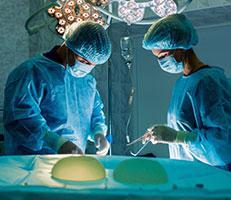Breast Cancer Specialist
Elizabeth Arena, MD F.A.C.S.
Board Certified Surgical Oncologist & Director, Breast Center at Surgery Group LA located in Los Angeles, CA
2 Total Reviews
Dr. Elizabeth Arena always appreciates feedback from her valued patients. To date, we’re thrilled to have collected 2 reviews with an average rating of 5 out of 5 stars. Please read what others are saying about Dr. Elizabeth Arena below, and as always, we would love to collect your feedback.
Breast Cancer Q & A
What is breast cancer?
Breast cancer is the second most common type of cancer for women in the United States and the most common type of cancer for women worldwide. It happens when there is an overgrowth of abnormal cells in the breast tissue and can affect both women and men.
With breast cancer, abnormal cells grow at an accelerated rate and grow into masses that may spread and affect other tissues and organs. Typically, malignant breast tumors begin in the milk-producing ducts, but cancer also develops in the glandular tissue and other parts of the breast.
There are several types of breast cancer, including ductal carcinoma in situ (DCIS), inflammatory breast cancer, lobular carcinoma in situ (LCIS), invasive ductal carcinoma (IDC), and lobular carcinoma. Breast cancer may spread through the lymphatic system, which is a drainage system that extends throughout your body.
Screening for high-risk patients, early diagnosis, and expert surgical oncological care help to effectively treat breast cancer, improving your long-term prognosis when you get a frightening diagnosis.
Who is at highest risk for breast cancer?
While women are at a much higher risk of having breast cancer, it may also affect men, especially when they have significant risk factors.
Factors that may place you at higher risk for breast cancer include:
- Advanced age, with increased risk over 50
- History of radiation exposure
- Being overweight
- Family history of breast cancer
- History of breast disease
- Early-onset of menstruation (before age 12)
- Late-onset of menopause (after age 55)
- No childbearing or childbearing after age 30
- Use of hormone therapy
You may also be at higher risk if you have genetic mutations such as BRCA1 or BRCA2. The presence of these inherited genetic markers may indicate that you’re more likely to have malignant breast disease. High-risk screening, including genetic testing, may help catch breast cancer early or assist in making decisions about treatments if you have breast cancer.
What services help to prevent and treat breast cancer?
Dr. Arena and her team offer holistic care, integrating traditional and alternative strategies for the prevention and treatment of breast cancer.
Services include:
- High-risk screening
- In-office genetic testing
- In-office ultrasound
- Multidisciplinary treatment plans
- Patient-guided plans of care
- Traditional and alternative treatment strategies
Dr. Arena uses advanced oncoplastic surgical techniques, including nipple-sparing mastectomy. While most breast lumps are benign, Dr. Arena and her team excel at providing the highest quality care and treatment when you have breast cancer.
For a consultation regarding breast cancer screening or treatment, call the office or schedule an appointment online with the practice of Elizabeth Arena, M.D., F.A.C.S.
SERVICES

Breast Cancer

Nipple Sparing Mastectomy

Oncoplastic Surgery

Breast Lump

Breast Pain

Genetic Testing

High Risk Screening

